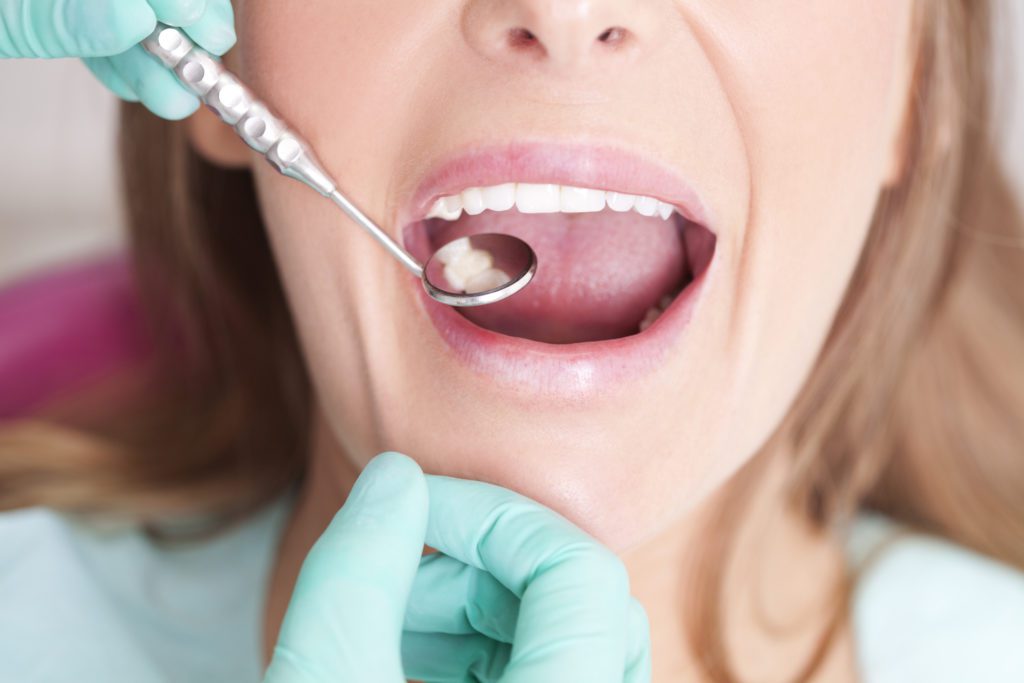Gum disease is an infection of the gum tissue that often begins as gum inflammation or gingivitis. As gum inflammation progresses, it can easily become periodontitis, also known as gum disease. At Perfect Smiles, we offer periodontal disease treatment to our patients in Bensalem, PA, and the surrounding areas.
Teeth do not have stability or structure without the support of the gums. Professional gum disease treatments help restore oral health to our patients. Perfect Smiles’ periodontal disease treatment plans are a restorative dentistry solution.

Signs of Gum Disease
Common signs of gum disease include:
- Gum sensitivity and inflammation
- Bleeding gums when brushing and flossing
- Receding gums
- Bright red or purple-tinged gums
- Bad breath (Halitosis)
- Gum pockets
If you have noticed any of these symptoms, please call our office for a dental exam. We will help you find the appropriate treatment that fits your needs. It is important to visit the dentist to prevent gum disease from progressing. Over time, periodontitis can lead to gum recession and tooth loss.
The Stages of Gum Disease
There are four different stages of gum disease you can experience.
Gingivitis
This is the earliest stage of gum disease and the only one that’s reversible. Improper oral hygiene causes bacteria and plaque to build up at the gum line, causing irritation and inflammation to the gum tissue. If you continue to have lax oral hygiene, this plaque can harden into tartar. At the tartar stage, it’s even harder to remove.
Many patients don’t realize that they have gum disease in these early stages. This is why it’s important for you to bring any changes in your mouth to your dentist right when they happen. The side effects at this stage aren’t usually painful, which means many patients have this and don’t realize it. Most prominently, you’ll notice your gums bleeding regularly, multiple times a week.
Gingivitis is treated with increased oral hygiene. We may request that you come into the dentist office more frequently to ensure your mouth is getting properly cleaned. We may also provide you with specialized toothpaste or mouthwash that’s designed to target gum health.
Mild Periodontal Disease
At this stage, gum disease is no longer reversible. It can only be managed. The bacteria present start to eat away at your bone structure. They continue to get more aggressive and start to cause tooth loss. Scaling and root planing are the treatment options available at this stage. We clean the pockets between your gum tissue and bone to free them from debris and bacteria. Then, we smooth down the tooth roots so that the tissue can reattach to the bone.
Moderate Periodontal Disease
The bacteria continue to get more aggressive in this stage. Instead of just impacting your mouth, the bacteria get into the bloodstream. When this happens, your blood carries the inflammation and infection from these bacteria throughout your entire body. Gum disease bacteria can cause serious issues in other parts of your body, not just your mouth. Scaling and root planing are used at this stage as well.
Severe Periodontal Disease
At this stage, the infection has completely evolved into disease-causing bacteria. It aggressively attacks your body. Your gums ooze pus and blood, it’s painful to bite down or chew on anything, you have severe bad breath, and your teeth can get loose. If left alone, it leads to tooth loss. At this stage, only gum surgery or periodontal laser therapy can help manage the situation.
Treating and Preventing Gum Disease
There are a number of treatments that recommend for patients who are developing symptoms of gum disease:
Antibiotic Therapy
For patients who have deep gum pockets, we will recommend antibiotic therapy. For this treatment, we place the antibiotic medication in gum pockets that form as a result of periodontitis. We will often provide antibiotics and surgery for patients with severe cases of gum disease.
Scaling and Root Planing
Used in tandem, scaling and root planing are treatments that help remove the harmful bacteria that inflame the gums. Our dental hygienists can use thin metal dental tools to perform these treatments. During scaling treatment, our hygienists remove plaque and tartar from and beneath the gums. Root planing removes plaque and tartar buildup from the tooth roots. This smooths the roots and helps them reattach to the gums.
Pinhole Surgery
Using the pinhole technique, we can improve the gum line and reverse gum recession caused by periodontitis. To begin, we numb the mouth and create a small hole in the gum tissue. Through this hole, we can gently loosen the tissue and use it to cover the tooth roots. When compared to other gum grafting methods, pinhole gum surgery has a success rate of about 90 percent.
Request a Dental Consultation Today
Are you experiencing gum pain or sensitivity? Contact our office for a routine dental visit by calling 215-770-1081. You may also schedule a dental appointment with our team on our website. Please let us know about any sudden changes in the health of your teeth and gums. We will help you find the best solution for you.
